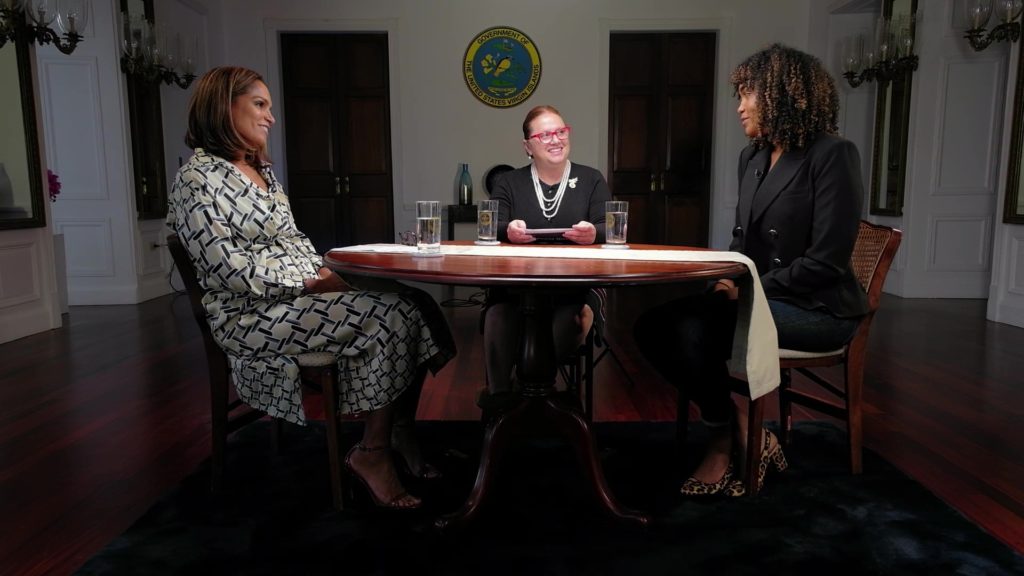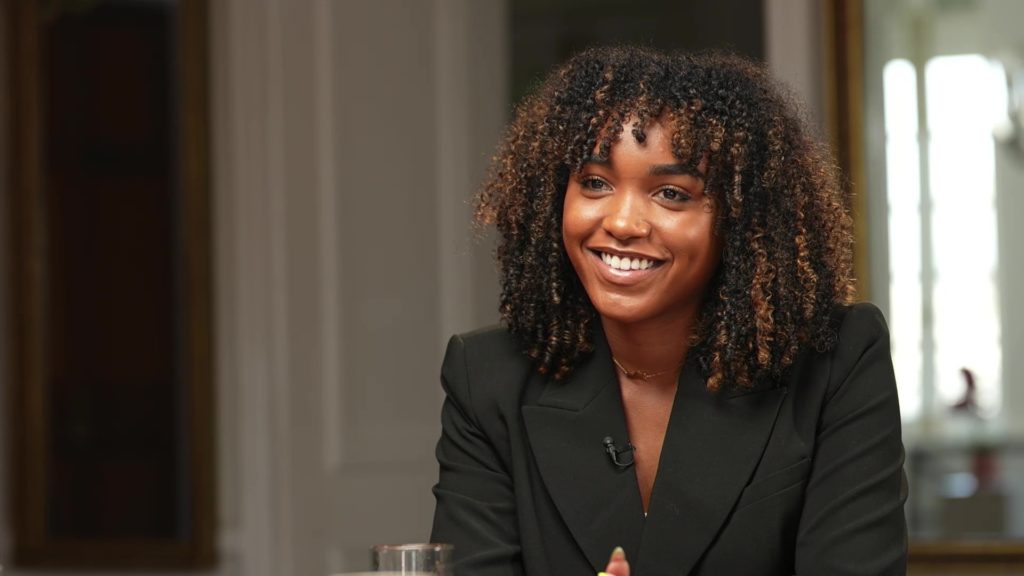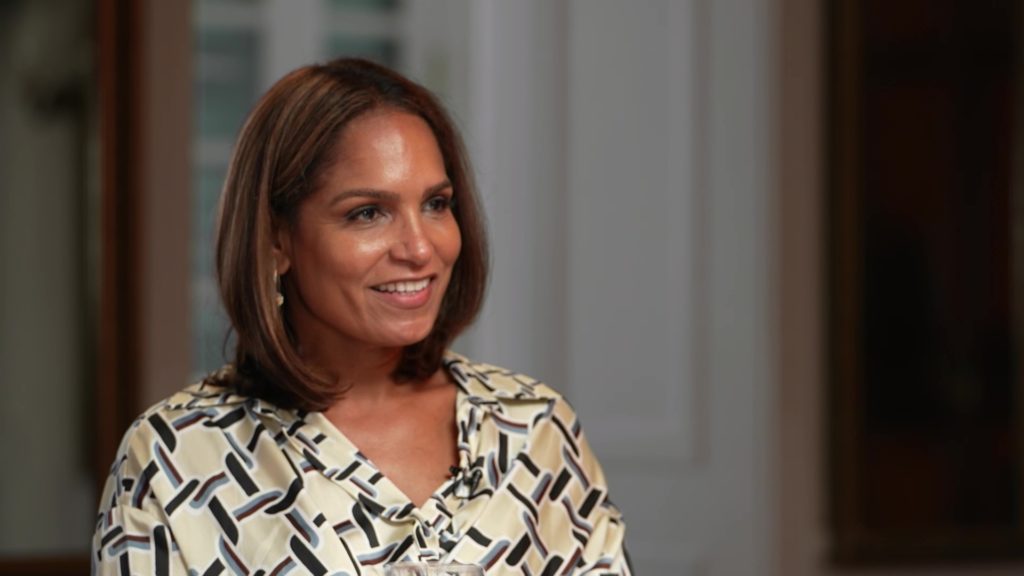
When Aliyah Bryan passed out while driving on the freeway in Atlanta three years ago, it was the wake-up call she needed to begin taking her diabetes seriously.
“I actually passed out while driving. I was in rush hour traffic, got off the freeway, and passed out because it was 5 o’clock, and I hadn’t eaten for the day,” said Bryan, the daughter of Gov. Albert Bryan Jr. and first lady Yolanda Bryan.
“When your lack of attention to your health starts to affect your friends and family, that’s when I started to get to the point where something has to change,” she said.
Aliyah Bryan, now 24, discussed her journey to finally accepting her disease during a special episode of the Press Box Wednesday night with her mother and Health Commissioner Justa Encarnacion.
Their roundtable discussion comes as Gov. Bryan plans a press conference on Monday at 9:30 a.m. at Government House on St. Croix to announce a new public-private partnership to enhance and increase health care, support services, and educational outreach for Virgin Islands residents living with diabetes and their families.
Lyna Fredericks, director of Chronic Disease and Health Promotion at the Health Department, said the government is planning a diabetes registry collaborating with the University of the Virgin Islands. “That’s going to allow us to identify people living with diabetes, and we can offer more targeted resources” and support, she said.
Additionally, her office will resume diabetes self-management classes in January, said Fredericks – an important service in the territory where diabetes is the sixth leading cause of death and Type 2, traditionally considered adult-onset, appears in younger populations, according to Encarnacion.
Type 1 diabetes is typically diagnosed at an early age because the pancreas does not produce insulin. Whereas Type 2 is often associated with obesity and can be managed well with lifestyle changes if caught in time, Type 1 requires insulin and a healthy diet to control.

Diagnosed with Type 1 diabetes just shy of her 12th birthday, and as she was preparing to enter middle school, Aliyah Bryan said that at first, she was in denial – a very common reaction, said nurse and certified diabetes educator Desiree James, who also appeared on the show.
“For a long time, I think I was in this period of denial and I kind of convinced myself that if I didn’t acknowledge it, it didn’t exist. My mom would always get upset at me and say, ‘Do your friends know you have diabetes?’ and I would be like, ‘No.’ It was all for fear that I would be treated differently,” said Aliyah Bryan.
However, “the inconvenient truth was that I had a chronic illness that I would have for the rest of my life,” she said.
As she progressed through high school, she wasn’t always accountable for her actions, which led to conflict at home, Aliyah Bryan admitted.
“Me as a 24-year-old diabetic is much different than me as a 15-, 16-year-old diabetic. My mom can tell you; we got in so many arguments over my health. While other kids got their phones taken away for getting bad grades or speaking out, I got my phone taken away because I was not checking my blood sugar. I was lying about what I was eating or if I ate at all,” she said.
For her part, Yolanda Bryan recalled first learning of her daughter’s diagnosis and feeling intense guilt about whether she had done something wrong during her pregnancy to cause the illness. She had not, of course – they learned there is a genetic predisposition to the disease on the governor’s side of the family. Immediately, the first lady set about educating herself on how best to manage the condition, which she said at first was overwhelming.

“I’m a Google doctor,” she said, laughing, but the truth is, she spent hours researching the disease and an inordinate amount of time at the grocery store, reading labels and trying to determine the sugar content of the foods she was buying.
“Nutrition is very, very important. In fact, eating the way a diabetic eats is the way we should eat. That is small portions, six times a day, and incorporating your fibers and your healthy greens,” and making mindful decisions, said Yolanda Bryan. “And exercise. We know that all too well in our household.”
In fact, Yolanda Bryan is taking the lessons she has learned as the mother of a diabetic child and turning them into a fun book of recipes and information aimed at children.
“The thought was – it’s for children and families – primarily to get kids to eat a bit better by dispelling aversions they may have and recipes that will bring them into the kitchen with the help of a sibling or adult to create great snacks … so they are playing with their food, they’re having fun,” while learning how to eat more healthfully, she said.
As much as she was raised to be mindful of her health, Aliyah admits the lessons learned sometimes fell by the wayside during college and upon graduating and launching a tech startup, which led to a lot of stress and anxiety.
“Here I was, 21 years old, a young Caribbean woman at the table speaking with middle-aged white men, and there were these voices in my head amplifying the thoughts I was already having, saying ‘You don’t belong here,’ ‘I shouldn’t be here.’ So, I started getting counseling because I wasn’t eating, I wasn’t sleeping, so these stresses were starting to manifest themselves physically. That’s when I really saw my health start to take a turn for the worse,” said Aliyah Bryan.
She said that passing out behind the wheel of a car in heavy traffic was a wake-up call, and she offered some wisdom for others who might be struggling with the disease.
“Number one, the sooner that you acknowledge that you are a diabetic, this is something you are going to have for the rest of your life, and you start to take steps to benefit your health, the better,” said Aliyah Bryan.
“Number two, allow yourself grace. You’re human, and we’re all fallible. We all have the capacity to slip back into bad habits. It’s not been a steady uphill climb. It’s been more of a trot with lots of peaks and valleys. You have to allow yourself room to fall down and get back up again,” she said.
“Number three, if you’re a student living with diabetes, seek out counseling. Utilize your school’s counseling services. Talk to somebody. Don’t allow your mental health to start to manifest itself into your physical and affect you.”


